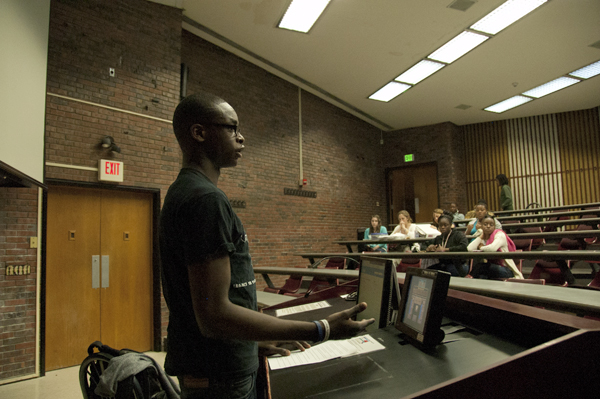
The non-profit organization Invisible Children released a 30-minute video, “Kony 2012,” designed to draw attention to a man named Joseph Kony, accused of numerous war crimes.
The Invisible Children website said Kony is the leader of the Lord’s Resistance Army (LRA), a later incarnation of a religious movement called the Holy Spirit Movement (HSM) which started in Northern Uganda to oppose the presidency of Yoweri Museveni. When the leader of the HSM, Alice Lakwena, was
exiled, Kony assumed management of the group.
According to the International Criminal Court (ICC), Kony is accused of being the commander-in-chief of the LRA and a warrant for his arrest was issued by the ICC on July 8, 2005.
The warrant said Kony is criminally responsible for 12 counts of crimes against humanity, which include murder, rape and inhumane acts of inflicting serious bodily injury and suffering, and 21 counts of war crimes, including cruel treatment of civilians, intentionally directing an attack against a civilian population, pillaging and forced enlistment of children.
The on-campus chapter of Invisible Children worked for years to draw attention to the crimes Kony has committed, Co-President Jaime Albanese said. However, it was only in recent weeks, after the release of the “Kony 2012” film, that the movement drew national attention.
Albanese said she first saw the viral-momentum the video had been gaining via a post on Twitter. Soon she and other club members saw posts from friends and family on Facebook featuring the video and began receiving phone calls and text messages from friends who wanted to talk about the movement and the video.
The video has received its share of criticism, however, not only for attempting to give the Western World a quick means of absolving themselves of certain guilt, but also for over-simplifying a complex issue.
“I feel like it simplifies a complex problem, engages Americans in ‘slacktivism’ (by posting the video on their Facebook as opposed to actually donating money), pockets donations that some people actually do send to the organization,” fourth-year English and Asian studies major John Sotomayor said.
Jacqueline van den Bergh, a member of Invisible Children, said the club supports those who critique and question the movement and that they understand the validity of the skepticism.
“You can’t put the history of a 26-year war in a 30-minute video,” van den Bergh said.
Van den Bergh also said it’s important for students to actively seek out the information and the facts from credible sources and that it’s important to pay attention to the biases of sources.
The Black Student Union (BSU) held a program called “Kony 2012: Fact or Fiction?” on Wednesday, March 28 in the Lecture Center to address the criticisms and hold a conversation about the film.
Vice President of BSU Jada Young said the group held the forum to open up a dialogue with students about the way they consume a movement like “Kony 2012” and the effects the good intentions of the West have on Africa.
“I want people to understand that there’s a history behind Western Intervention in Africa, ” Sen. Jonathan Espinosa said. “Foreign intervention to fix the problem is not [the] answer. ”
Espinosa said he wanted people to challenge the narrative designed by films like “Kony 2012” that depicted an inaccurate and condescending “us and them” binary. He credits this narrative to the Western outlook on the situation.
“This whole narrative that they are helpless and hopeless is ridiculous,” Espinosa said. “You can’t go into a culture and try to save everybody.”
